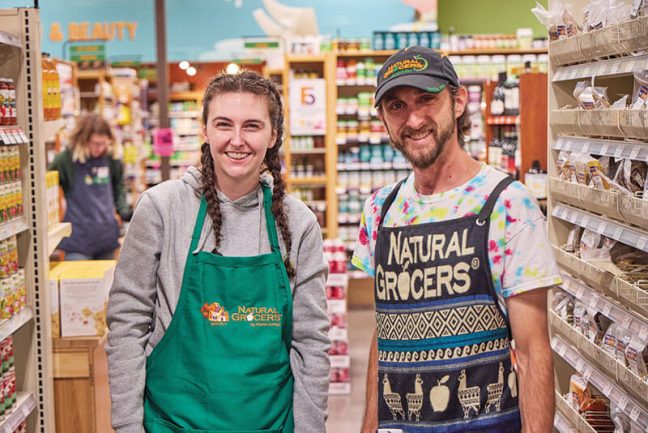“I guess I would say that it is getting harder and harder to hold the line.”
That’s the assessment of Grier Bailey, executive director of the Colorado Wyoming Petroleum Marketers Association, referring to the livelihoods of smaller retailers in Colorado such as convenience stores and independent grocers.

“There aren’t a lot of good things to report in Colorado,” Bailey said in September. “The cost of regulations continues to drive up operational costs. Overregulation is now the single greatest threat small groceries face.”
He said that many of the smallest retailers in the state just had their remaining sales tax vendor allowance taken away.
HR 1 – the federal One Big Beautiful Bill Act – reduced the number of federal dollars the state would receive, so the Democrat-controlled state legislature determined that the “‘large corporate tax breaks’ and ‘tax breaks for billionaires’ meant that small grocery stores needed to lose a portion of the $57 million, spread across all sectors, that Colorado allowed the smallest stores to retain,” Bailey said.
Retailers that had taxable sales of $1 million or less across all locations had been able to retain 4 percent of the taxes they collected, with a cap of $1,000 per month.
“It’s important to remember, though, that food for home consumption and things like fuel don’t have the state sales tax applied, so a lot of small grocery stores were eligible,” he said. “Twelve thousand dollars [a year] isn’t a lot and was a nod to operating in one of the most complicated taxing jurisdictions in the country.”
Environmental battles
Environmental groups continue to propose bills that impact businesses’ bottom lines as well.
One group is pushing a plan to charge an annual fee for companies that operate commercial buildings that are 10,000 square feet or more and draw vehicle and truck traffic. The companies would pay $1 per square foot annually, so the minimum would be $10,000.
“Basically, they are concerned that all the federal and state grants to their organizations are beginning to dry up, so they want the commercial business space to start providing money to CDPHE [Colorado Department of Public Health and Environment], who would then turn around and issue Environmental Justice/Disproportionately Affected Community grants to them so they can continue to make things harder and more expensive for businesses in Colorado.
“This will only serve as a direct cost increase on grocery stores and convenience stores, which will be passed on to Colorado families,” Bailey said.
He says there are other ways to benefit the environment that don’t involve annual fees, such as adding EV charging stations, requiring all deliveries to be made with electric trucks and changing refrigeration to approved equipment.
“CWPMA is fighting hard with our partners in trucking, the commercial building space and consumer groups against this measure,” he said.
The state currently is implementing the extended producer responsibility law that was passed in 2022. EPR requires producers that use packaging material and paper products in their manufacturing process to pay annual fees called producer responsibility dues that support recycling services.
Bailey said the law is estimated to cost package producers over $400 million, “all of which will be passed down through the supply chain and ultimately through to consumers,” Bailey said.
One victory from the past legislative session was the defeat of a bill that would have required a “shaming” sticker on fuel pumps that said, essentially, that fuel is bad for the environment. Fines would have been $20,000 per day for stations that didn’t have the stickers applied.
Soft drinks cut from SNAP
On the SNAP front, Gov. Jared Polis earlier this year requested that soft drinks be excluded from the list of Supplemental Nutrition Assistance Program-approved items, and the USDA granted that request. The target implementation date is March 1.
The state also asked for SNAP eligibility to be extended to items purchased at farmers markets and hot deli counters, but those are still under consideration, Bailey said. There is hope of getting those approved, as he noted the USDA “has been receptive of our comments relative to implementation and rollout.”
More battles
While there is some recognition of the vital nature of food retailing to Colorado communities, there seems to be a disconnect around how laws impact these retailers.
“I think in the food space we have a lot of regulatory partners that care about the service grocers provide to communities,” Bailey said. “So, while our sector hasn’t been hit as hard as other sectors, there is a growing concern that small business has lost its voice and there are simply not enough legislators that represent small towns that can help anymore.”
When avian flu impacted egg supply this past spring, smaller grocery warehouses asked for a temporary waiver of the state’s cage-free egg law to help address the shortages.
“We didn’t get a waiver that would have helped small groceries and communities with supplies and some costs of that protein,” Bailey said. “Ten years ago, that would have been different.
“It has been a long time since there was split control at the legislature, and it’s been almost a generation since we had a Republican governor, so there have been a lot of boards and commissions that haven’t had a ‘business appointee’ in a long time,” he continued.
Speaking of commissions, the Colorado Lottery Commission is taking steps to formalize internet lottery gambling through third-party courier services. These “drive foot traffic away from legitimate and community-supporting businesses,” Bailey pointed out.
The commission also is considering finalizing a rule that will allow lottery purchasers to use credit cards at licensed lottery retailers.
“Credit cards fees are substantial and will eat into the commission the Lottery Commission pays for sales,” he said.
Bailey said the CWPMA continues to push for card fee relief. While a bill that would have prohibited interchange fees on point-of-sale taxes, among other things, made it through the House this past session, it stalled in the Senate.
The plan is to introduce it again next session.
Bailey also cautioned that a bill is expected to be introduced that would prevent retailers with a pharmacy license from selling tobacco.
“That will put upward pressure on other product categories to simply maintain the revenue you have now,” he said.
Consumer strains
For consumers, “the overriding concerns in Colorado is cost of living and the prevalence of crime in the Front Range cities,” Bailey said.
According to the Uncover Colorado website, “The Front Range Urban Corridor is home to Colorado’s largest cities like Denver, Colorado Springs, Pueblo, Boulder and the surrounding suburbs. College towns like Greeley and Fort Collins are also included in the corridor…”
“Colorado is simply unaffordable for many new families, and that is having an impact on growth,” Bailey said.
In addition, “retail theft continues to close stores in certain communities.”
New housing developments continue to pop up, however, especially in the north Front Range, which creates the need for grocery stores.
“So there continues to be opportunity, but the state and local governments – outside of the rural areas and a limited number of counties like Mesa, Weld, Douglas and El Paso, as examples – continue to make things harder through building codes, energy mandates and limitations on things like parking spaces,” he added.
Store activity
There is a good bit of store activity in the state, comprising a mixture of chain and independent grocers. 
- Home state retailer Natural Grocers, based in Lakewood, celebrated its 70th anniversary this year. Just before press time, the grocer unveiled its remodeled store in Centennial. The company said that upgrades to the Cherry Knolls store, which opened in 2010 at 6774 S. University Blvd., were designed to give customers “a brighter, more open atmosphere” in which to shop.
The store also added a center for nutrition education, recipe demonstrations and community events. More room is devoted to body care, beauty products and organic produce, and more supplements were added as well.
Natural Grocers operates 45 stores in Colorado out of 169 across its 21-state footprint.
- A new Whole Foods Market will open Oct. 9 in Parker. The 43,000-square-foot store is located at 8665 Kings Point Way. Among its features are 700 products from more than 115 Colorado suppliers.
Arvada Press reported in February that Whole Foods has received approval for its first store in Arvada. The store will open in Northridge Shopping Center in the former Hobby Lobby space.
- A new Trader Joe’s opened in Westminster July 25. The store, at 9350 Sheridan Blvd., is in City Center Marketplace in a vacant space between an outdoor outfitter and a golf store.
- Fresh Market & Community Kitchen opened in the Woodlawn Shopping Center in Littleton in early 2025 in a space that formerly housed a Family Dollar.
The Littleton Independent said the store, owned by Husain Abdulla, his family and other employees, offers a halal food option for area shoppers. The store sells organic and traditional produce, mainstream groceries, Asian spices, Middle Eastern groceries and other international items.
- In June, Super Market Gonzalez opened on the east side of Pueblo in a former Dollar Tree. Owner Evans Gonzalez decided area residents needed closer access to fresh fruits and vegetables. Canned vegetables, rice, beans and packaged foods also are available.
In late August, the store issued an apology via Facebook to customers who had encountered language barriers at the store.
“Effective immediately, our store is under new management and staffed with a fully bilingual team – fluent in both English and Spanish. This ensures that all of our valued customers can receive the attention, assistance and service they deserve,” the store said.
“We sincerely apologize for any inconvenience this situation may have caused and for the times when your questions went unanswered. We also understand that some customers may not have returned because of this matter. Today, we invite you to give us another opportunity to serve you with professionalism, respect, and dedication.”
- The Chaffee County Times reported Aug. 4 that Buena Vista town officials are reviewing a proposal for a new City Market at U.S. Hwy. 24 North and Crossman Avenue.
The City Market, a Kroger banner, would be about 60,000 square feet versus the current store’s 23,000 square feet. Planning and zoning commission approval is needed; hearings could take place this fall. Should the project move forward, the store is expected to open in 2027.
- Four King Soopers Marketplace stores have opened this year – in the Flying Horse shopping center in Colorado Springs in late January; in Fort Collins at South College Avenue and West Drake Road, also in late January; in May in Frederick in the Silverstone Marketplace shopping center; and in Fountain at the end of July, near Mesa Ridge Parkway and Syracuse Street.
- An Aug. 23 article in The Daily Sentinel in Grand Junction said the former Sutherlands building materials store near Mesa Mall is undergoing renovations, with about 15,500 of the 58,000-plus-square-foot space expected to house an as-yet-undisclosed grocery store.
- Korean/Asian grocer H Mart may yet open a store in Colorado Springs, according to an Aug. 22 article in the Colorado Springs Gazette. The store first was announced in late 2021, but the plans were rejected and never resubmitted, according to a Facebook post from the Pikes Peak Regional Building Department. H Mart reportedly is adjusting its plans, including changing to refrigerants required by the state, for resubmission.
- WinCo Foods could open its first stores in the state of Colorado – in Thornton, Firestone and Loveland, according to various media reports. The proposed Thornton store would be 84,000 square feet, located in Larkridge Shopping Center at 164th Avenue and Washington Street. The Boise, Idaho-based grocer also reportedly has purchased parcels of land in Firestone and Loveland for potential stores.
- Ten Safeway stores reportedly will shut down in the state by Nov. 7, along with single stores in New Mexico and Nebraska.
The closures are partly due to the company’s Intermountain and Denver divisions being consolidated into one, the Mountain West Division, as well as sales levels, according to a Sept. 10 article in The U.S. Sun, which added that about 50 Colorado Safeway stores were impacted by a union strike that was settled in July.
The Colorado Safeways that are shutting down, according to an infographic from CBS News, are: 201 E. Jefferson, Englewood; 500 E. 120th Ave., Northglenn; 1653 S. Colorado Blvd., Denver; 12200 E. Mississippi, Aurora; 3657 S. College Ave., Fort Collins; 860 Cleveland Ave., Loveland; 5060 N. Academy Blvd., Colorado Springs; 1425 S. Murray Blvd., Colorado Springs; 315 W. 2nd St., La Junta; and 906 E. Olive St., Lamar.
The closings will leave rural areas like La Junta and Lamar without a full-service grocery option and will cause consumers in other less-affluent areas to have to travel farther to shop for groceries, the article noted.
- 9 News reported in April that Walmart was planning to remodel 25 stores in Colorado as part of the 650 it would refresh across the country. Bolder signage and new displays as well as some expanded departments –including online pickup and delivery – are included in the changes.
[RELATED: Whole Foods Market Preps To Open Store In Parker, CO]

